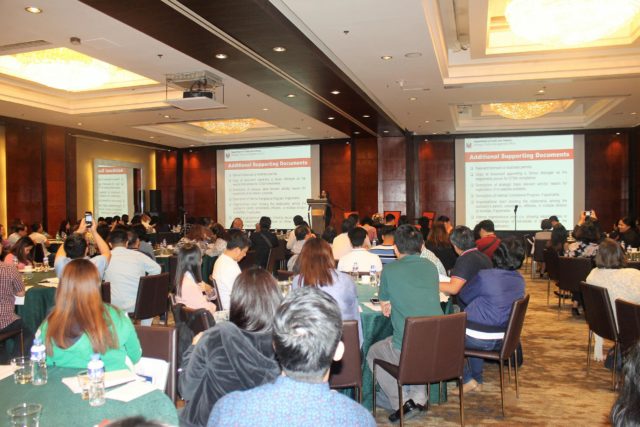
The implementation of the Strategic Trade Management Act (STMA) and the registration of traders, transport companies, and other service providers that export, import, and move strategic goods pursuant to the new law have been moved to later dates.

Registration has been reset from early this year to the fourth quarter of 2019, while implementation of the law, particularly for exports, is eyed for the middle of 2020, according to Strategic Trade Management Office (STMO) supervising trade-industry development specialist Engr. Lorenz Anthony Fernando.
He disclosed this in a presentation during the recent “Complying with the Strategic Trade Management Act: PH Registration Requirements and Classification Rules for Strategic Goods” forum jointly held by PortCalls, Asia Customs & Trade, and Philippine Multimodal Transport and Logistics Association, Inc.
Republic Act (R.A.) No. 10697 (An Act Preventing the Proliferation of Weapons of Mass Destruction [WMD] by Managing the Trade in Strategic Goods, the Provision of Related Service, and for Other Purposes) or STMA, was signed in 2016 to comply with United Nations Security Council Resolution No. 1540. The UN resolution “imposes binding obligations on all states to adopt legislation to prevent the proliferation of nuclear, chemical and biological weapons, and their means of delivery, and establish appropriate domestic controls over related materials to prevent their illicit trafficking.”
Strategic goods are products that, due to security reasons or international agreements, are considered to be of such military importance that their export is either subject to specific conditions or prohibited altogether.
The law aims to regulate the export, import, transit and transshipment, reexport and reassignment of strategic goods, software and technology and the provision of related services to prevent WMD from proliferating. Its implementing rules and regulations were signed only last September 2018.
Fernando said STMO, which serves as the executive and technical agency of the government in establishing the systems for managing the trade of strategic goods pursuant to STMA, is still hiring and training people, and has yet to set up the online system for the registration of stakeholders and implementation of the law.
A pilot testing of the process will also be conducted prior to implementation to “make sure it will run smoothly and the industry will not be burdened,” Fernando noted.
STMO will also provide a grace period for stakeholders before implementing new items in the National Strategic Goods List (NSGL), a list of the strategic goods that need authorization.
He said STMO is currently talking to several international funding agencies about financing the development of STMO’s IT infrastructure to enable the online registration and the act’s implementation.
Fernando clarified that STMA is focused more on exports than imports, as the latter is already regulated by other government agencies such as the Philippine Drug Enforcement Agency and Philippine National Police-Firearms and Explosives Division.
“Whatever they are regulating, we will not regulate it,” he assured.
This is why the first phase of implementing the STMA will start with exports, before gradually covering transit/transhipment, reexport/reassignment, related services (e.g. transporting, brokering), and imports. Fernando said STMO will announce the target dates for the other phases.
He added that not all items in the NSGL require import authorization, as mostly only highly sensitive items and those covered by international conventions and treaties, such as chemical weapons and arms, need it.
Customs hotline
STMO senior trade-industry development specialist Domina Pia Salazar, during the open forum of the same event, said STMO will provide a hotline specifically for Bureau of Customs (BOC) inquiries on whether an item is regulated under the STMA.
Also, STMO is going to train BOC’s Container Control Unit personnel on identifying what goods or commodities require authorization from STMO.
Romeo Leneses, Jr. of the BOC Import Assessment Service, for his part, assured that BOC “has no right” to require clearances for commodities that are not included in the NSGL.
Prior to the registration in the last quarter and implementation next year, STMO said there will be industry outreach programs, especially for small and medium enterprises and economic zone and Freeport locators. The outreach includes briefing on the law and in-depth training on how to classify goods, which is the responsibility of the company applying for registration with STMO.
Fernando said that later this month, STMO will hold trainings in its office every week for interested companies.
Under the STMO’s IRR, registration is required before one can apply for an authorization to export, import, reexport, or provide services related to strategic goods. Any person who engages or intends to engage in the export, import, and reexport of strategic goods, or provides related services such as brokering, financing, transporting, or giving technical assistance must register directly with STMO prior to applying for an authorization or a governmental end-use assurance.
The authorization permits only a specific transaction, or a series of transactions, as described in the application and any supporting documents. An application may be approved in whole or in part, or limited by conditions, or have other restrictions appearing in the authorization itself.
Under the NSGL, there are three annexes: military goods, dual-use goods, and nationally controlled goods.
Military goods refer to goods, software, and technology that are specifically designed, developed, configured, adapted, or modified for military end-use.
Dual-use goods refer to items, software, and technology which are intended for both civil and military end-use, or are used to develop, produce, handle, operate, maintain, store, detect, identify, or disseminate WMD or their means of delivery.
Nationally controlled goods, on the other hand, refer to strategic goods placed under unilateral controls for reasons of national security, foreign policy, antiterrorism, crime control, and public safety. However, STMO has no goods under this category yet. – Roumina Pablo








